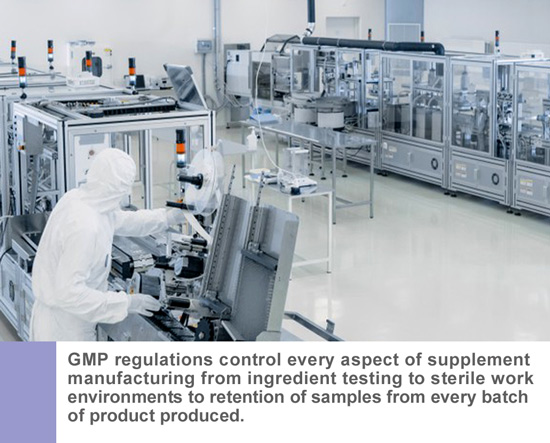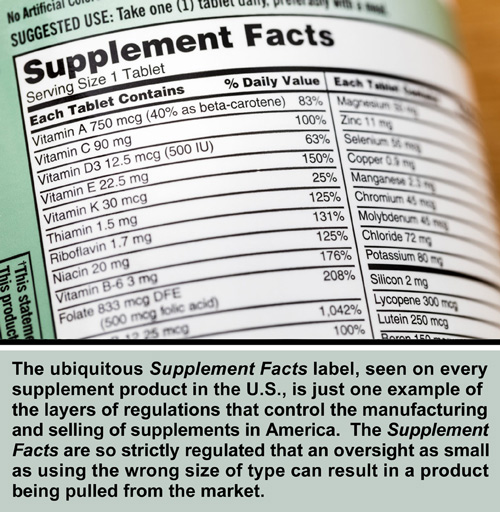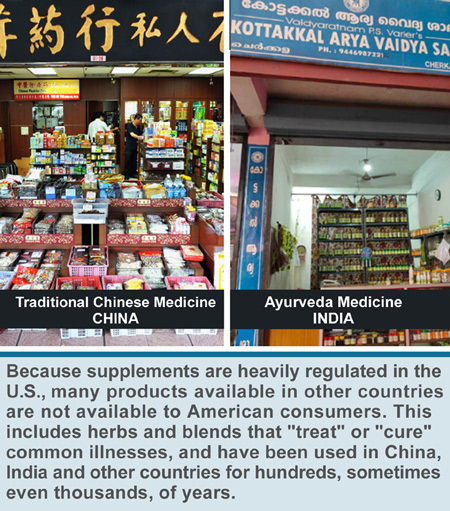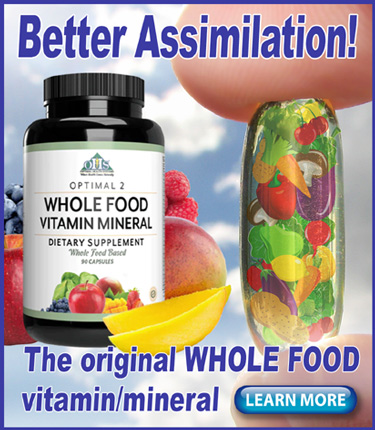A special report by Optimal Health Systems:
On March 18, 2024, Senator Dick Durbin of Illinois announced that he intends to reintroduce his failed 2022 Senate bill (S.4090) forcing strict regulations on the manufacturing and selling of nutritional supplements. In his letter to four dietary supplement industry trade associations, Durbin lamented that supplements are essentially “unregulated.”
On the same day in a large U.S. city, a Chinese tourist walked into a health food store and asked for an herbal supplement that he can buy on just about any street corner in China. The tourist thinks he contracted some minor food poisoning at a restaurant the night before, and knew exactly what he needed from previous experience.
After being informed that supplements can’t “cure” anything, and that he would need an FDA-approved drug—only available with a prescription—the surprised tourist commented, “Wow, you really have strict regulations in America.”
So, which is it… are supplements heavily regulated in the U.S., or not? Is Senator Durbin, who has waged a regulatory war against supplements for decades, correct; or is the Chinese tourist, who, in his own country, can buy traditional healing herbs and supplements without a prescription, correct?
Let’s delve into the layers of laws that regulate supplements and let the reader decide.
1. “Before-Market” DSHEA regulations
Most people would be surprised to learn there are regulations that guide the introduction of new dietary ingredients—even before the supplements enter the market.
While the 1994 Dietary Supplement Health & Education Act (DSHEA) provided some protection for supplement manufacturers, it also introduced new regulations on the creation of new supplements.
Part of DSHEA is the New Dietary Ingredient Notification process, which grants the U.S. Food & Drug Association (FDA) the opportunity to acknowledge or reject new ingredients within 75 days.
Additionally, the law allows for the FDA to remove ingredients if and when safety or adulteration concerns are documented. In other words, while consumers may never hear about it, numerous supplements are “regulated” out of existence within a couple of months—or didn’t even make it to the store shelves in the first place.
2. AER regulations
AER, or Adverse Event Reporting, is a system mandated by law for supplements, just as it is for pharmaceutical drugs. By law health professionals are required to report suspected adverse events.
The FDA uses a “Safety Reporting Portal” for tracking these reported adverse events. The site is similar to the MedWatch system used for reporting adverse effects from pharmaceutical drugs.
The only difference is that supplements can be (and often are) pulled from the market following just a handful of reportings.
Meanwhile a pharmaceutical can log thousands, and sometimes millions, of adverse event complaints (as in the case of Covid vaccines) and still not be pulled from the market.
If supplements were given the same leeway as FDA-approved drugs—as in not pulling a supplement until if received tens of thousands of complaints—no supplement would ever be withdrawn from the market.
This is because adverse events for supplements are rare compared to pharmaceuticals, and it is unlikely a supplement would ever receive the volume of AERs that drugs do.
3. Labeling regulations
The 1994 DSHEA law also gave the FDA authority to regulate the labeling of supplements.
From this regulatory authority came a plethora of strict guidelines involving “Supplement Facts” panels, ingredient listings, and other minute details.
Anyone who has picked up a bottle of supplements knows there are similar black and white panels on all labels. Rather than exemplifying “no regulations,” these ubiquitous panels demonstrate that all label manufacturers and sellers are following strict guidelines on everything from the ingredients in the product down to the typeface on the label itself.
4. GMP regulations
GMP stands for the “Good Manufacturing Practice” that is regulated into law for many industries. GMP was extended to supplements in 2007. In that year the FDA issued its Final Rule on Current Good Manufacturing Practice for Dietary Supplements (CGMP). And, once again, utilizing CGMP the government took the path of regulatory strictness.
For example, while dietary supplements are technically part of the “Food” category in the Food and Drug Administration, the CGMP regulations are actually designed after 21 CFR 210 and 211… the more stringent GMPs used in pharmaceutical production.
The enactment of these regulations forced many supplement companies out of business as it takes a certain amount of resources to manufacture supplements under similar GMP rules as those followed by billion-dollar drug companies.
For the uninitiated consumer who believes the media’s claim that supplements are an “unregulated free-for-all,” it may be a real eye-opener to learn just how strict these regulations are.
The rules cover every aspect of manufacturing, including: facility cleanliness; water supply quality; protection of raw materials and finished goods against contamination; equipment sanitation, maintenance, and performance verification; process controls; quality control sampling and testing; employee hygiene practices; sample retention from every batch for quality control; and much more.
The rule also mandates that formal standard operating procedures (SOPs) must be written, followed, and documented for every lot of finished goods produced in the plant.
To quote the exact wording in the rule itself: “”Quality means that the dietary supplement consistently meets the established specifications for identity, purity, strength, composition, and limits on contaminants, and has been manufactured, packaged, labeled, and held under conditions to prevent adulteration under section 402(a)(1), (a)(2), (a)(3), and (a)(4) of the Federal Food, Drug, and Cosmetic Act.”
5. Federal regulations restricting product claims
Perhaps the most strict of all supplement regulations is the DSHEA rule that gave the FDA authority to restrict claims that can be made about a product or nutrient. The most restrictive of these regulations involves “healing” or “curing” claims.
For example, a supplement manufacturer may promote a product as “nutritionally supporting” weight loss or building the immune system; but a supplement maker cannot make any claim about treating or curing.
By law, no supplement in the U.S. can cure any disease. Period. Only drug makers can make this claim for their products. This was not the case for most of U.S. history, and it is not the situation in most of the world’s countries today. But it is the strict regulatory situation in the U.S. today.
The irony is that at the same time the media insists supplements are “unregulated” in the U.S., manufacturers who make any kind of “treating or curing” claim face fines, forced business closure, and even prison time.
This is why consumers will see “Does not treat or cure any disease” disclaimers on every website, label, brochure and piece of marketing. No person or company wants to risk the regulatory wrath of the U.S. government.
The unintended consequence of this particular law deprives American consumers of hundreds of traditional ingredients that are readily available in countries with fewer regulations—including African, Asian and Mideastern countries.
6. Lawsuits are a de facto regulation
While not thought of as a regulation per se, the fact that supplement manufacturers can be sued for false product claims or adulterated products adds another layer of protection for the consumer. Since manufacturers carry liability insurance for the unlikely event of their product causing an injury, it provides a form of protection the government does not provide.
Moreover, since no manufacturer wants to be sued for providing a sub-standard product, manufacturers have a major incentive to provide quality products. This incentive is perhaps greater than the threat of regulatory prosecution.
Ironically, pharmaceutical companies are protected by law against lawsuits. One could say they are “un-regulated” in this regard. This protection was conveyed in 1986 when President Ronald Reagan signed into law the National Childhood Vaccine Injury Act (NCVIA). This law created immunity for pharmaceutical companies from lawsuit over claims from vaccine injury.
7. Additional regulations by other federal agencies and state governments
If the thousands of pages of regulations enforced by the FDA are not numerous enough to convince a skeptic consumer, consider that other federal agencies have their own regulations that also affect the manufacture and marketing of supplements.
Though these regulations come in many shapes and forms, those imposed by the Federal Trade Commission are perhaps the most bountiful. They add their own rules on how supplements are labeled, marketed and sold. And, as with the FDA regulations, violations of FTC regulations can result in the withdrawal of products, fines and even criminal prosecution.
Last, but certainly not least, state governments add their own layers of regulations on the supplement industry.
Recently, state governments have been active in the areas of age restrictions and weight loss ingredients—two areas where some states feel the federal government doesn’t go far enough.
Fortunately some of these laws have been struck down by the courts in an apparent nod to the fact that the U.S. is over-regulated, not under-regulated in the supplement sphere.
– – –
With all these layers of regulatory oversight it is difficult to understand how lawmakers like Senator Durbin think supplements are unregulated, or even under-regulated. Of the almost 200 other countries in the world, none come close to the voluminous amount of regulations at play in the U.S.
Moreover, with the proven safety record of supplements during the past few decades, one wonders about governmental priorities. Federal lawmakers and the FDA could better serve the safety of the American people by addressing the fentanyl crisis that is responsible for the deaths of over 100,000 Americans each year.
– – –
Sources: NutraceuticalsWorld.com, FDA.gov, Wikipedia – NCVIA.




